Question mark over the future of 58 police buildings – BBC News
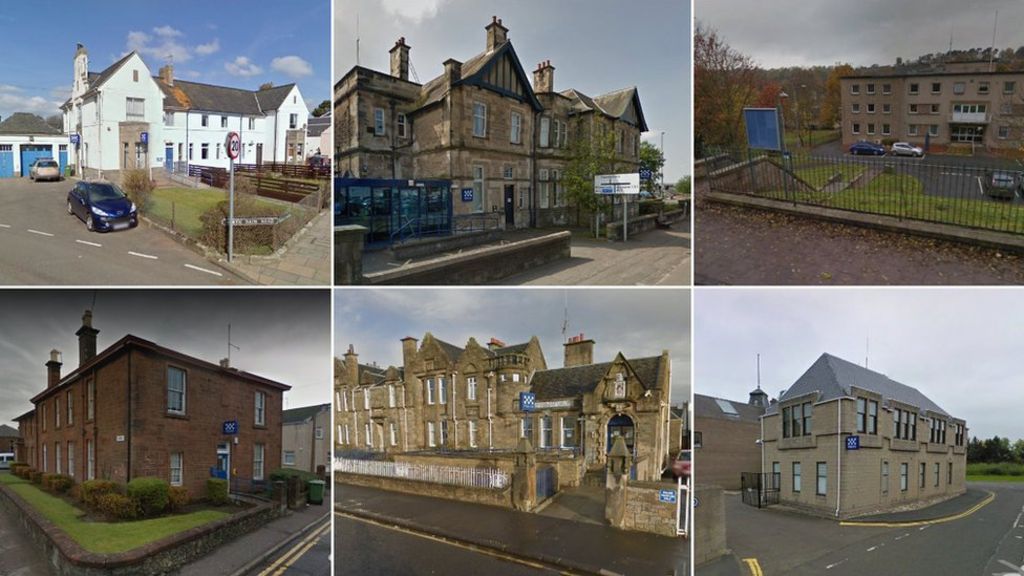
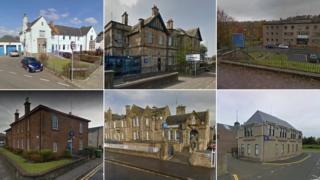 Image copyright Google
Image copyright Google The future of dozens of police stations across Scotland is under threat, BBC Scotland has learned.
Police Scotland has drawn up a list of buildings in 58 locations which could be closed as part of a wide-ranging estate review.
Properties in Carnoustie, Leith, Hawick, Oban, Port Glasgow, Ayr and Larkhall are among those under review.
The force said there was “no pre-determined outcome” to the consultation and some buildings may be retained.
Where properties are declared “surplus to requirements”, police officers and staff may be moved to nearby alternative, shared offices.
Police criticism
Details of the plans only emerged in response to a Freedom of Information request from BBC Scotland.
It has led to accusations of secrecy and claims that local communities have been kept in the dark about the proposals.
MSP Oliver Mundell said he only learned about the threat to eight police stations in Dumfries and Galloway when he was tipped off by a constituent.
“A local resident in my constituency found out by asking a surveyor at a local police station what they were doing,” he said.
“They were there surveying to find out how much it was worth.”
Police Scotland said many of the properties were the subject of an early part of the consultation process, which was not yet open to the wider public.
Location of police properties under review
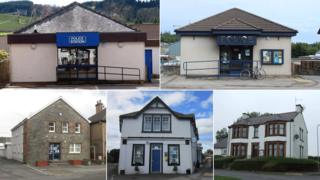 Image copyright Other
Image copyright Other North: Broughty Ferry, Bridge of Earn, Stanley, Letham, Muirhead, Carnoustie.
East: Bannockburn, Bridge of Allan, Bo’ness, Bainsford, Tullibody, Anstruther, Edinburgh High Street, Leith, Armadale, Fauldhouse, Blackburn, Gorebridge, Loanhead, Hawick, Haddington, Bonnyrigg, Newbattle.
West: Pollokshaws, Barrhead, Giffnock, Erskine, Gourock, Lochwinnoch, Port Glagow, Kilmacolm, Carradale, Lochgilphead, Taynuilt, Campbeltown, Inverary, Oban, Blantyre, Carluke, Larkhall, Lesmahagow, Shotts, Hamilton, Rutherglen, Biggar, Cambuslang, Ayr, Galston, Kilwinning, Largs, Dalry (Dumfries and Galloway), Dalbeattie, Gretna, Kirkcudbright, Langholm, Moffat, Thornhill, Whithorn.
Source: Police Scotland
An estate strategy published by Police Scotland last year revealed plans to reduce floor space by up to 25%.
It said the move could generate annual revenue savings of between 5m and 18m a year and property sales could raise up to 34m for the force.
A total of 397 properties were operated by the force in 2013 and since then 44 have been declared surplus to requirements.
In 2014, dozens of police front counters were closed in a move which was widely criticised by Scotland’s main opposition parties.
Under the new proposals, police officers and civilian staff may be asked to share office space with other public agencies in a system which is already operating in parts of Scotland.
The first combined emergency services station opened in Tomintoul in April 2014, where police, ambulance and the fire service operate from one building.
And in Cupar in Fife, police officers work alongside council staff.
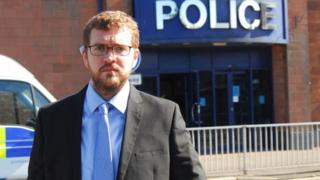 Image copyright Oliver Mundell
Image copyright Oliver Mundell However Oliver Mundell, a Scottish Conservative, fears the move could ultimately threaten the visible presence of police officers in local communities.
“Of the stations that are closing in Dumfries and Galloway, Police Scotland’s justification is that they’re not routinely manned,” he said.
“Two or three years ago [when they closed the front counters], they promised the stations would stay open.
“The problem with the proposal to share space is that two or three years down the line, they’ll see that they’re not being used, then they’ll be removed all together.
“There are cases for sharing spaces but you need interview rooms, you need cells.”
He added: “Police stations are not like bank branches. It’s not about how many customers are using them, it’s about ensuring a safe and minimum presence in the community.”
Green MSP John Finnie, a former police officer who sits on Holyrood’s justice committee, said it was “entirely right” that public agencies assess their property portfolio.
But he added: “If this is part of a further withdrawal from communities, that would be very worrying… When I look at the list and I see Oban, Campbeltown, Taynuilt, Lochgilphead, where are these alternative facilities?”
‘Shocking state’
Gordon Crossan, the president of the Association of the Scottish Police Superintendents, told BBC Radio Scotland that Police Scotland was facing “significant budget challenges”.
“Many of these stations are already obsolete, they’re expensive to run, they’ve limited facilities, so we’re reviewing that to see what could provide a better service for the public for the money that they give us to deliver policing,” he said.
Speaking on Good Morning Scotland, Mr Crossan said footfall at local police stations was low and most people now contact the force by phone or internet.
He added that he “strongly welcomed” the prospect of sharing space with other public agencies.
“Anything that provides a collaborative approach to delivering public services which saves them money and hopefully improves the services has got to be welcome,” he said.
“Bearing in mind that a lot of these stations are in a shocking state of disrepair, which they have been for many, many years.
“Police officers are working a stressful situation and then they’re going back to these stations where they should be getting respite and actually they’re not fit for purpose.”
Last month Calum Steele, the general secretary of the Scottish Police Federation, raised concerns about the “crumbling police estate”.
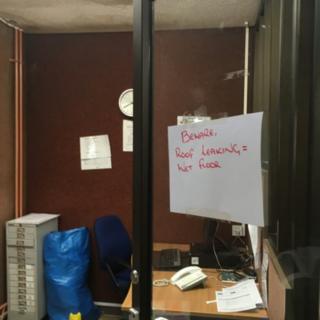
 Image copyright Police Federation
Image copyright Police Federation He told the SNP conference that patrol cars were being held together with duct tape and cable ties, while interview suites for sex assault victims were damp with mouldy carpets.
In response to BBC Scotland’s findings, he said: “The standard of the police estate in many areas is nothing short of scandalous.
“Decades of neglect have left the new service with responsibility to rectify the mistakes of the past.
“That being said the service needs to appreciate the public value their police stations and must ensure police services are maintained in all of our communities.”
A spokesman for Police Scotland said their estates strategy determined that their estate should be “demand-led, collaborative and modernising”.
He said the properties which are under review did “not match policing requirements and are subject to some form of consultation with communities, partners or staff”.
‘Engaged extensively’
He added: “In some cases the discussion may simply be with partners to explore whether there are alternative opportunities to support service delivery, such as use of shared premises.
“It can be appropriate to understand the availability of options before progressing to wider consultation.
“Before seeking to declare a police office surplus there will be a community element to consultation, but how that is completed will vary with each premises. Some proposals may be withdrawn before it reaches that stage.”
The Scottish government said decisions around operational policing were a matter for Police Scotland “working in partnership with individual communities across the country”.
A spokesman added: “This government has made clear that we wish to see the community focus of policing further strengthened.
“That is why we have engaged extensively with local government and with communities themselves on our new Strategic Police Priorities which were published on 5 October and have localism at their core.”